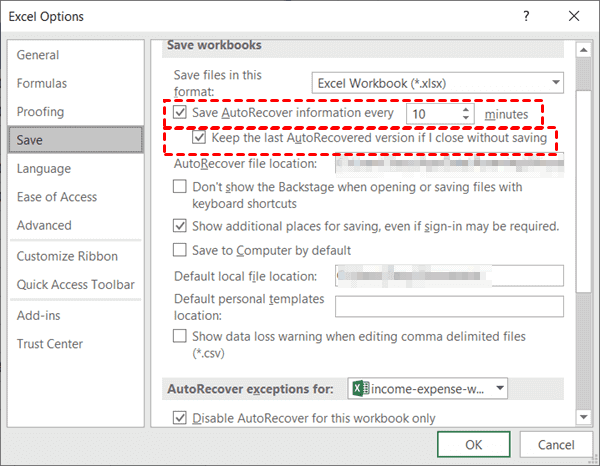5 Proven Ways to Recover Deleted Sheets in Excel

Excel is an essential tool for many in the business and academic world, with its versatility and robust features for data management. However, accidents happen, and sheets or entire workbooks can be accidentally deleted, causing significant loss of data and productivity. Here are five proven methods to recover your deleted sheets in Excel:
1. Use Excel’s AutoRecover Feature

One of the first lines of defense against data loss in Excel is the AutoRecover feature. This function automatically saves copies of your work at regular intervals, providing an opportunity to recover unsaved changes or documents in case of a system crash or accidental closure.
- Check the AutoRecover Files:
- Go to the File tab and click on Info.
- Under Manage Workbook, select Recover Unsaved Workbooks.
- Browse through the list and look for any relevant document. Excel might have a version that was autosaved before the sheet was deleted.
- Adjust AutoRecover Settings:
- Navigate to File > Options > Save.
- Ensure that ‘Save AutoRecover information every X minutes’ is checked, and set a shorter time interval if you prefer more frequent saves.
- Keep ‘Keep the last autosaved version if I close without saving’ enabled.
Notes:

📋 Note: AutoRecover can only save your work if Excel closes unexpectedly; it won’t recover sheets deleted while Excel is still running.
2. Recycle Bin Search

If you’ve deleted an entire Excel file, check your computer’s Recycle Bin. If the file isn’t there, then:
- Restore from Recycle Bin:
- Open the Recycle Bin.
- Locate the Excel file and right-click on it.
- Select ‘Restore’ to return the file to its original location.
- Use Third-Party Software:
- There are numerous data recovery tools that can scan your hard drive for traces of deleted files.
- Tools like Recuva, Stellar Data Recovery, or Disk Drill can help you recover deleted Excel files.
Notes:

🚨 Note: Be cautious when using recovery software, as improper use can lead to further data loss or corruption.
3. Search for Temporary Files

Excel often creates temporary files during your session, which can be a lifesaver if you’ve lost work. Here’s how to look for them:
- Locate Temp Files:
- Type %temp% in the Windows Run dialog box (Windows Key + R).
- Look for files named similar to ~$ followed by your Excel document name.
- Recover Data:
- Open these temporary files in Excel to see if they contain your data.
- Be aware that these files might not be complete or functional but can provide valuable data recovery.
Notes:

⚠️ Note: Temporary files can be difficult to find and interpret, and some might require a specific software or method to open or recover data from.
4. Previous Versions and Backup

If you have a backup system in place or have enabled Previous Versions in Windows:
- Restore Previous Versions:
- Right-click on your Excel file > Properties > Previous Versions.
- If available, you can open or copy the earlier versions back to the current date.
- Backup Recovery:
- If you regularly back up your data, check your backup for the last saved version before the sheet was deleted.
- Backup tools like Windows Backup, Time Machine on Mac, or external drive backups can be your savior.
Notes:

🔄 Note: Previous Versions require the file to be saved in a location where this feature is supported, typically network drives or supported storage with versioning.
5. Contact IT or Use Recovery Services

In severe cases, or if you have no luck with the above methods:
- IT Department Recovery:
- If your organization has an IT department, they might have recovery tools or backup systems not available to regular users.
- Reach out to IT for assistance or report the data loss as soon as possible.
- Professional Data Recovery Services:
- For mission-critical data, professional services offer a higher chance of recovery with specialized tools and techniques.
- These services come with a cost but can be worth it for important data.
Notes:

💾 Note: Professional data recovery services can be expensive but are a last resort for recovery of highly valuable data.
To enhance your productivity, knowledge of these recovery methods is crucial. While Excel provides tools to help recover from mishaps, good practices like regular backups and autosaving can minimize data loss. In summary, you can recover deleted sheets through AutoRecover, Recycle Bin, temporary files, previous versions, and, as a final option, IT or professional services. Be prepared, be cautious, and ensure your data remains safe with these proven recovery methods.
How often should I set Excel to AutoRecover?

+
You might set AutoRecover to save every 10-15 minutes, depending on how frequently you work with large or critical Excel files.
Will third-party recovery software always recover my data?

+
While these tools can recover data, there’s no guarantee, especially if the files were overwritten or the drive has physical damage.
Can I recover a deleted sheet if I don’t have backups or IT support?

+
Without backups, the likelihood of recovery drops, but methods like AutoRecover or third-party tools might still help if the data hasn’t been overwritten.



